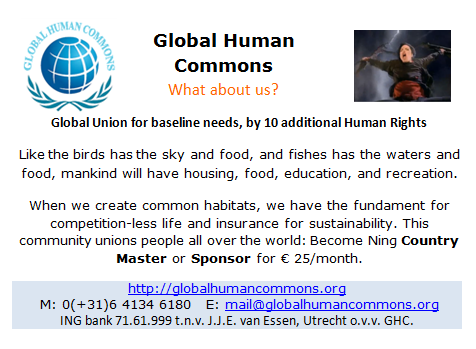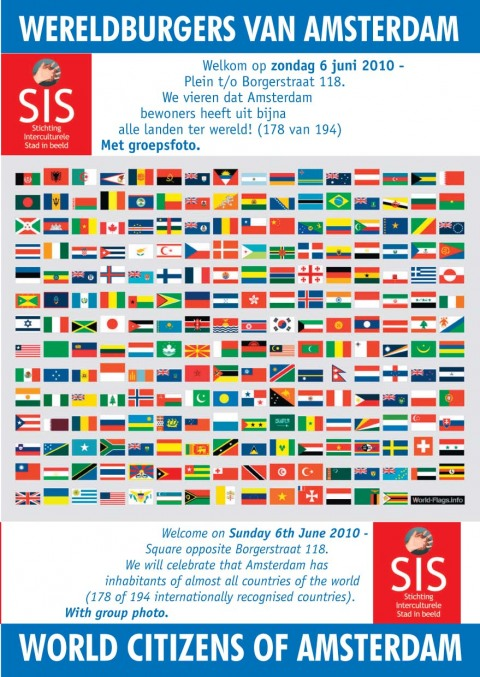

Global Human Commons
What about us?

Global Union for the baseline needs for Life and Wealth
Coalitions and cooperations:
- All Win Network
- Antroposphere Inst.
- ARINA
- Be Commons
- Centre for Global Negotiations
- COMMONS CAMPUS
- Development4all
- E2Us
- Essence Admin
- Essence Sum
- Global Commons Trust
- Inst. for Planetary Synthesis
- Kosmos Journal
- Nature College
- One Childs Village
- On the Commons
-
P2P Foundation
- Recyclus
- Share the World’s Resources
- StarrPort
- SUM Foundation
- Summit Speak,
- Trees Have Rights Too
- URSULA
- VipCure
- Wiser Earth
- World Citizens Action
- Association of World Citizens
- Yours to? Mail us your URL!
Of course we have to maintain, harvest, produce, and distribute. And we need to have the right to competition and capitalize on not basic rights and needs as luxury and want to haves. So we will. But not out of hunger, poverty, or survival. Not as slaves or financial dependents.
How to create this? We can and will share our wisdom, funds, assets, time, and labor. I will honor the people who came up with this idea, and ask all human beings to join and support this union.
People and commons: global partnership missing links (also in pdf)
The environment, the economy and social relationships are interrelated aspects of sustainable development and what are increasingly being referred to as commons.
Commons are shared resources that naturally belong to collectives and provide
the natural and social capital upon which all life depends. Therefore, where people
have the jurisdiction to do so, they tend to be highly motivated to sustain their commons, and these commoners have developed countless initiatives to achieve this. A rights-based approach to sustainable development — based upon
environmental protection and restoration, economic prosperity and social justice to benefit all people and the planet as a whole — would recognize the value of various local, regional, national and global commons. This would motivate people and form the strongest possible foundation for a global partnership for development.
Governments need the support of the people to equitably and sustainably
manage various commons and undo their unsustainable patterns of production and consumption at local through global scales. Where Governments support people to
take greater responsibility for their vital resources, they will:
(a) motivate citizens
and businesses to support commitments to sustainability; (b) engage citizens and
businesses in being proactive about sustainability;
(c) educate citizens and
businesses about their consumption patterns and costs to the environment; and
(d) generate equitable funding that reinforces healthy patterns of production and
consumption through improved protection of various commons.
The incorporation of people and their commons in actions that benefit all
people and the planet as a whole is the strongest possible foundation for global
partnerships for sustainable development. It integrates sustainable local, regional,
national and international development because all parties and initiatives reinforce
one another.
Here are a few structural changes inspired by a commons approach:
(a) achieving the internalization of environmental costs;
(b) establishing rules and
guidelines for the use and management of common resources;
(c) creating incentives for sustainable development;
(d) setting rents or surcharges on the use of common
resources;
(e) developing economic instruments that increase as the sustainability of
the commons increase, with benefits accruing to people of the given commons.
Thousands of initiatives can be found on the many websites dedicated to local to
global commons (including www.onthecommons.org) and in the work of Nobel
Prize winner Elinor Oström.
Because they are dedicated to preserving the global commons for all people
and the world as a whole, global commoners can integrate global partnerships for
development.
We request Governments to create a panel of experts within the United Nations
Secretariat to explore with experts on the commons ways to incorporate a commons
approach into global strategies for sustainable development. The panel would report
back to the preparatory committee for the Rio+20 conference to inform the
preparations for that summit.
GLOBAL RESOURCE AGENCY (extra 13MB pdf)
In HARMONY with NATURE Request of the Sec. Gen. for letter writing
- UNPA Campaign
- 1We
- THE EARTH CHARTER
- WORLD CITIZENS OF AMSTERDAM - JUNE 6:


